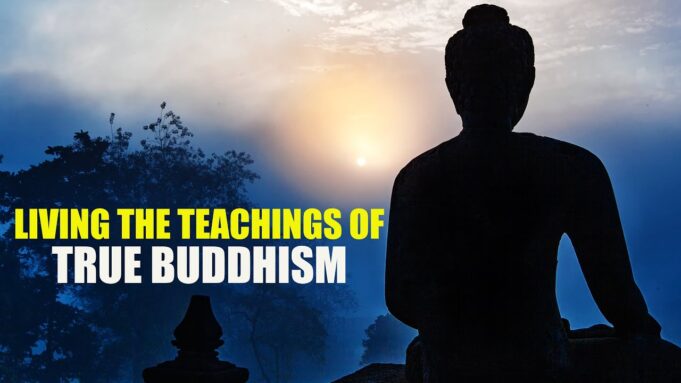Nichiren Buddhism emphasizes the importance of the three types of actions, thoughts, words and deeds, in the practice of Buddhism. Strictly speaking, the Daishonin is the only person who read the Lotus Sutra in deed, in word and in mind. In our case, to carry out the three types of actions means to bar evil and do good in each action we take, each word we speak and each thought we think. This is a very important thing in our practice of Buddhism. When we read a passage from the Gosho over and over and memorize it word by word, we feel as if we have read it in deed. Later, however, we discover that we understood it only in word and mind.
No matter how deeply we may understand a principle, it remains a mere theory and therefore meaningless if we don’t apply it to everyday life.The second president, Josei Toda, used to say, To understand a theory is one thing, and to put it into practice is quite another. You know that sugar is sweet, but your knowledge won’t sweeten a cake which has no sugar in it. You also know that a hundred million yen is two times fifty million yen, ten times ten million yen, or a hundred times a million yen. Yet again, this knowledge alone won’t buy anything at a department store. Knowing or understanding something is quite different from actually possessing it. Just because you understand the teaching that life is eternal, it doesn’t follow that you have made that teaching part of your life.
In most cases we mistakenly think that we have read some passage in deed when in fact we have done so only in word and mind. Let’s review several well-known passages from the Gosho and see if we are reading them in deed. “When the skies are clear, the ground is illuminated. Similarly, when one knows the Lotus Sutra, he understands the meaning of all worldly affairs.
Buddhism is like the body and society like the shadow. When the body is crooked, so is the shadow. These passages are easy to understand, and we can explain what they mean when giving guidance. The question is whether we ourselves are living these teachings. More often than not we forget to straighten up the body our own faith and only try to unbend the shadow. A passage from the Gosho states that “one should become the master of his mind rather than let his mind master him.” Far from being the master of our minds, we often find ourselves being controlled by our earthly desires.
SGI President Daisaku Ikeda once emphasized the necessity of changing our ways of thinking. He said: “Most people look at things from the standpoint of the world in which they live. But it is no longer time to stand on the earth and gaze at the sun. We have entered an age in which we need to observe our planet from the standpoint of the sun. Now that the second phase of kosen-rufu has commenced, we must earnestly ponder what our individual missions are and what we should do to accomplish them. Let’s ask ourselves whether we are doing as he advised us.
“If you try to treat someone’s illness without knowing what the cause of the illness is, you will only make the person sicker than before. The Gosho, Curing Karmic Disease, states that there are six causes for illness, the sixth and most deeply rooted being the effects of evil karma. When we fall ill, however, we tend to consider only the immediate cause and influences and begin looking about frantically for some form of medical cure. If you propagate it the doctrine of ichinen sanzen (The concept of three thousand realms in a single moment of life), devils will arise without fail.
Were it not for these, there would be no way of knowing that this is the true teaching. As practice progresses and understanding grows, the three obstacles and four devils emerge, vying with one another to interfere. When devils emerge, they do not announce that they are devils. Remember that they lodge themselves in the weak spots in our faith. Not to be swayed by devils means not to be defeated by them but to muster sufficient courage and wisdom to overcome them.







